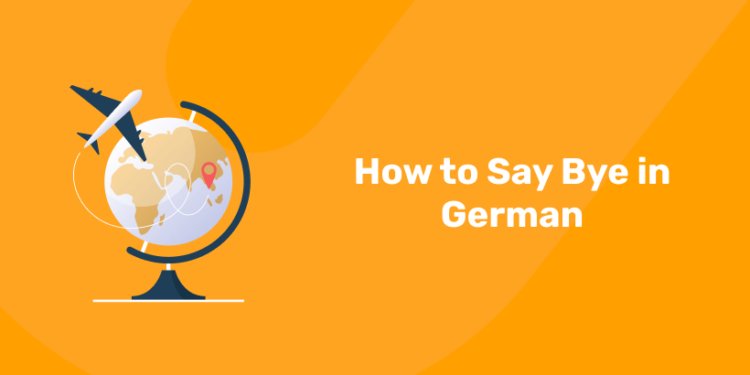Table of Contents
There are many ways to say goodbye in every language, and this is also true in German. With so many options, it is important to choose the right Verabschiedung (farewell) for each situation. Here are some ways to say goodbye to your friends, acquaintances and colleagues in Germany, Austria and Switzerland, in both formal and informal settings, to leave the best possible impression.
1. Tschüss – “Bye”
2. Tschau – “Bye”
3. Viel Spaß – “Have fun”
4. Bis bald / Bis später – “See you soon / later”
5. Schönen Tag noch – “Have a great day”
6. Wir sehen uns / Man sieht sich – “We’ll see each other (again)”
7. Mach‘s gut – “Take care”
8. Gute Nacht – “Good night”
9. Auf Wiedersehen – “Until we see each other again”
10. Auf Wiederhören – “Until we hear each other again”
11. Servus – “Goodbye” (Southern Germany and Austria)
Master the German Language with Entri App! Click Here for Free Trial Class!
1. Tschüss – “Bye”
Tschüss is the most common way to say “goodbye” in German. Whether you want to say goodbye to a friend, a co-worker, or your in-laws, tschüss is one of the most useful basic German expressions you can learn. However, it is not appropriate in formal business settings where Auf Wiedersehen is a more formal way to say goodbye.
2. Tschau – “Bye”
Tschau or ciao is roughly equivalent to tschüss. Although this expression was once more common in Austria and southern Germany than in the north, it is now heard on a daily basis throughout the German-speaking world. Tschau is derived from the Italian ciao, but unlike Italians, Germans do not usually use this expression as a greeting, but rather as a goodbye.
3. Viel Spaß – “Have fun!”
It is a warm way to say goodbye to your friends or family if they are going on a trip or vacation.
4. Bis bald / Bis später – “See you soon / later”
It’s a nice, simple way to say “see you soon/later!”. You can refer to morgen (tomorrow), Montag (Monday), nächste Woche (next week), or any other time or day you hope to see this person again!
5. Schönen Tag noch – “Have a great day”
You’ll probably hear this phrase most often from salespeople when you’re done shopping, although it’s of course used in many other contexts. Be prepared to respond cheerfully: “Danke gleichfalls,” which means “you too.”
6. Wir sehen uns / Man sieht sich – “See you around” or “see ya”
This is a fairly casual way to leave, so it’s a practical way to end a conversation with your friend, but not very appropriate in a formal setting.
7. Mach‘s gut – “Take care”
You can add this to one of the other farewells to add a little warmth to the farewell, for example: “Bis Dienstag Mach’s intestines!
8. Gute Nacht – “Goodnight”
This is how we usually say good evening in Germany. We use it at the end of the day, when one of you is getting ready for bed. At the start of the evening, you can say “Guten Abend”, but be careful, this means “hello” or “good evening” and not “good night” or “goodbye”.
9. Auf Wiedersehen – “Until we see each other again”
This is one of the first phrases you will learn in German class, but in recent years it has become less and less used outside of formal situations. It is relatively rare among young people, who prefer the shorter phrases tschüss or tschau. However, it is still a nice way to talk to new acquaintances, older people and colleagues. It is often shortened to Wiedersehen, which can be said in a cheerful voice and sung with emphasis on the last syllable.
10. Auf Wiederhören – “Until we hear each other again”
This expression is roughly equivalent to Auf Wiedersehen, but it is only used when talking on the phone. “Auf Wiedersehen” means that after meeting someone, you hope to see them again in the future. But if you are talking on the phone, you cannot see them, so you say that you hope to hear from them again. This is a formal expression, and is usually only used in an office or customer service environment these days.
11. Servus – “Goodbye” (Southern Germany and Austria)
Servus can be used as a friendly greeting to say hello as well as goodbye to someone. It is widely used in southern Germany and Austria, but not in northern Germany. It comes from the Latin servus (to serve you).
Common German greetings and farewells
In this section, we will look at some of the most common greetings and goodbyes in German.
Since you are likely to meet many strangers, especially if you are traveling, we will start with the formal phrases:
Formal German greetings and farewells
If you need to greet or say goodbye to people you do not know, such as hotel receptionists, sales staff and restaurant waiters, these formal German phrases will be very useful.
They will also work with older people, people in authority, colleagues and acquaintances.
| German Phrase | English Equivalent |
| Guten Morgen. | Good morning. |
| Guten Tag. | Good day; hello. [used from around noon until 6 PM] |
| Guten Abend. | Good evening. |
| Gute Nacht. | Good night. |
| Sehr erfreut! | Delighted! [used when meeting someone for the first time] |
| Wie geht es Ihnen? | How are you? [Not often asked in formal settings] |
| Schönen Tag! | Have a nice day! |
| Schönes Wochenende! | Have a nice weekend! |
| Auf Wiedersehen. | Goodbye. |
Informal German greetings and farewells
Use these phrases with people your own age, younger people, family members, and friends.
| German Phrase | English Equivalent |
| Hallo. | Hello. |
| Hi. | Hi. |
| Ciao. | Goodbye [from the Italian; used widely in Europe] |
| Freut mich. | Nice to meet you. |
| Wie geht es dir? | How are you? [when talking to one person] |
| Mir geht es gut. Und dir? | I’m doing well. And you? |
| Wie geht es euch? | How are you? [when speaking informally to more than one person] |
| Wie geht’s? | How’s it going? |
| Es geht. | It’s going / it’s okay. |
| Alles klar? / Alles gut? | All good? [Answered with “Alles klar.”] |
| Na? | Hey, what’s up? |
| Lange nicht mehr gesehen! | Long time, no see! |
| Bis morgen. | See you tomorrow. / Until morning. |
| Bis bald. | See you soon. |
| Bis später. | See you later. |
| Tschüss! | Bye! |
Practicing German Greetings : The Tips and Tricks
1: How do you say "Good Morning" in German?
In any language, greetings serve as the foundation of communication, setting the tone for interaction and fostering connections. In German culture, greetings are more than just formalities – they convey respect, warmth and politeness. Whether you’re travelling to Germany, planning to meet up with German-speaking friends or are simply fascinated by the language, mastering how to greet people in German is essential.
- Try to talk to Germans
The best way to learn German is to talk to Germans, so talk to as many as you can – and visit the country as often as possible. For the most part, once you’ve mastered a language, you can’t really learn how normal people speak it – there are many phrases and terms that you really won’t learn unless you interact with Germans.
- Watch German content with subtitles
Watch German movies or films with English subtitles first, then switch to German subtitles as you progress. This can improve your listening skills and help you understand context and pronunciation.
- Immerse yourself in German
Try to immerse yourself in German as much as possible while you study. You can do this by watching German movies and TV shows, using German subtitles for English shows, reading German books or listening to German music. The best way to immerse yourself is of course to live and study in Germany. Here you will have the opportunity to practice the language every day.
- Start with the basics
There is no need to rush into learning a language, start by mastering the basics like the alphabet and simple words and expressions. Once you have mastered the basics, you can start expanding your knowledge. In fact, you may start learning new words before you know exactly how to use them correctly.
- Learn basic grammar rules early
If you don’t speak with correct grammar, people may have a hard time understanding you, so make sure you learn basic grammar rules early in your learning process – especially focusing on different genres if you don’t speak your native language.
- Start building sentences and expressions
Once you have learned the basic vocabulary, start creating sentences and expressions that you can use in everyday life. They can be very basic at first and become more complex as you learn more words and rules.
- Learn modal verbs
One of the most difficult things about German is the number of declensions and conjugations. Of course, learning all the forms of each verb can be very tiring and time-consuming. The divine solution could be the 7 modal verbs in German. When used in a sentence, these modal verbs replace the verb and push it to the end of the sentence in the infinitive form. This will help you learn and speak German faster because using these verbs allows you to use many verbs without knowing their tense.
The 7 modal verbs are as follows:
- können (can)
- wollen (want)
- sollen (should)
- dürfen (may/be allowed to)
- müssen (must)
- möchten (would like)
- mögen (like)
Master the German Language with Entri App! Click Here for Free Trial Class!
Free German A1 Mock Tests – Powered by AI!
Test your skills on our interactive platform. Get instant feedback from our AI to help you communicate better and track your progress. Start your free German mock test now.
Test Your German A1 for FreeConclusion
Learning how to greet in German is a great way to start learning German. You’ll be ready for basic conversations and making a good impression. Practice these greetings regularly to improve. As you learn more German, look for other learning tools.
Entri App offers private lessons with native German speakers. They can tailor their lessons to your learning style and goals. With their help, you will improve your German skills significantly. Starting to learn German means greeting others. Using these greetings every day will help you improve your language. It also shows that you want to connect with German speakers. So be brave, use these phrases and embark on an exciting journey of learning and culture.












